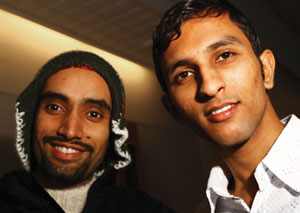 |
| Dewas Pokherl and Sudarsan Adhikari came to Dalhousie from Beldangi refugee camp in Nepal. (Bruce Bottomley Photo) |
Every year, thousands of people are on the run from their homes, escaping war, violence and persecution. They seek refuge in temporary camps that all too often end up becoming permanent.
Since 1978, the World University Service of Canada (WUSC) has extended a hand to young refugees—students like Sudarsan Adhikari and Damodar Pokherl, who can barely remember life outside of the camps.
"We first moved to Nepal in the 1990s. I was three years old when I left Bhutan and I spent most of my life as a refugee," says Sudarsen Adhikari, one of two WUSC refugee students sponsored by Dalhousie this year.
Mr. Adhikari and Mr. Pokherl were born into families of migratory workers who went to Southern Bhutan in waves in the 1950s and 1960s to work on infrastructure development projects. These projects took several years to complete so the families decided to settle in Bhutan.
The 1988 census revealed that Bhutan's population was 48 per cent Buddhist, 45 per cent Nepali and seven per cent 'other'. Concerned about the influx of Nepali migrants into Bhutan and the higher birth rate of the Lhotshampas, the ethnic group that Mr. Adhikari and Mr. Pokherl hail from, the ruling Druk majority feared that this demographic shift threatened their privileged position and traditional Buddhist culture.
Those Lhotsampa who could not provide proof of residency prior to 1958 were considered illegal migrants and told to leave.
Flight from Bhutan
"They did not act violently at first but the king acted in other ways. He thought that by providing an education for the Nepalese people would cause them to one day overthrow him. So, he had all of our books burned and schools destroyed,” relates Mr. Adhikari. "Then he forced us to take on the customs, traditions and dress of the Druk. Those who protested were beaten and jailed. Some we never heard from again."
Late one night, the Adhikari family fled from Bhutan into India." We spent several days wandering the country without food and water," says Mr. Adhikari, who is majoring in science.
Eventually the family found a representative from the United Nations Refugee Agency who helped them make their way to the Beldangi refugee camp in Nepal.
"We spent miserable days passed in the camp,” says Damodar Pokherl, who lived in the same camp as Mr. Adhikari. Local villagers, with whom they shared a common cultural heritage and in some cases were related to, complained that the refugees compete for employment and drive down wages, depress prices in the markets by selling their food rations, and contribute to crime and prostitution.
"If we were caught working for money, we would be beaten or have our things taken away from us," relates Mr. Pokherl, who is majoring in sociology and history.
Experiencing 'firsts'
The UNHCR in conjunction with government and non-governmental organizations such as WUSC took on the tasks of finding new homes for these refugees. The students arrived in late August last year after a three-day plane journey from Nepal. Their education is partially funded by the $1.50 student levy that every full-time Dalhousie student contributes.
They have been adapting to a university course load and life in Canada and say they are enjoying their life at Dalhousie. They’ve been working—without fear of persecution—in the Killam Library since October.
"I have experienced many firsts here," says Mr. Pokherl. "Before coming here, I had never rode a plane or an elevator. I had never seen snow with my own eyes. It was so wonderful."
Since 1978, WUSC's Student Refugee Program (SRP) has enabled more than 1,000 student refugees to resettle in Canada as permanent residents and pursue their education in an environment free of violence and fear. To find out more about WUSC’s Student Refugee Program, visit www.wusc.ca.
